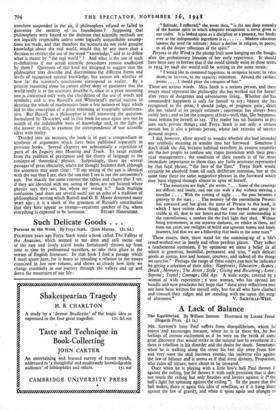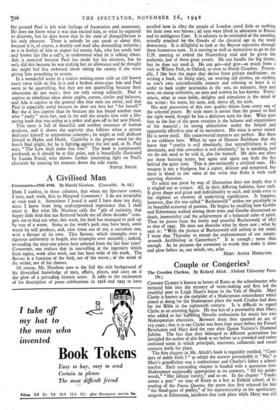A Lack of Balance
The Equilibriad. By William Sansom. Illustrated by Lucian Freud. (Hogarth Press. £1 Is.) MR. SANSOM'S hero Paul suffers from disequilibrium, which he enjoys and encourages because, when he is in these fits, he has feelings of intense excitement as if he were on the brink of some great discovery that would strike at the natural law to overthrow it ; there is rebellion in his disorder and the desire for death. Sometimes when he is walking along the street his feet slip away from him and very soon the skid becomes cosmic, the universe tilts against the law of balance and it seems as if that stern divinity, Proportion, who rules all nature, were about to be unseated.
Once when he is playing with a little boy's ball Paul throws it against the ceiling, but he throws it with such precision that it does not touch the ceiling but only brushes and hovers against it (" the ball's light fur spinning against the ceiling "). In the pause that the ball makes, there is again this idea of rebellion, as if it hung there against the law of gravity, and when it spins again and plunges to the ground Paul is left with feelings of frustration and monotony. He does not know what it was that excited him, or what he expected to discover, but he does know that in the state of disequilibrium is his only pleasure. There is nobody he can speak to about this, because it is, of course, a deathly and mad idea demanding isolation ; so it is foolish of him to expect his cousin Ada, who has sandy hair and brown lips like a calf's, to understand what he is talking about. Ada is annoyed because Paul has made her his mistress, but he only did this because he was making her an allowance and he thought she might feel less awkward about taking the money if she were giving him something in return.
In a wonderful scene in a station waiting-room with an old brown rusty stove with no fire in it and a broken stove-pipe Ada and Paul seem to be quarrelling, but they are not quarrelling because their obsessions do not meet ; they are only raving solitarily. Paul is captive to rebellious ideas about angles' curves, circles and balances, and Ada is captive to the general idea that men are awful, and that Paul is especially awful because he does not love her "for herself." But she is less captive than he because she has found another man who " really " loves her, and in the end she attacks him with a life- saving hook that was acting as a poker and goes off to her new friend.
This story is full of beautiful and sombre instances of human madness, and it shows the captivity that follows when a person dedicates himself to antinomian concepts ; he might as well dedicate himself to Hades and Death. Captivity is the proper word for the hero's final plight, for he is fightinKagainst the law and, as St. Paul says, "The Law shall make you free." The book is sumptuously produced, as it should be at this price, and is beautifully illustrated by Lucian Freud, who throws further interesting light on Paul's character- by creasing his trousers down the side seams.
STEVIE SMITH.





































 Previous page
Previous page